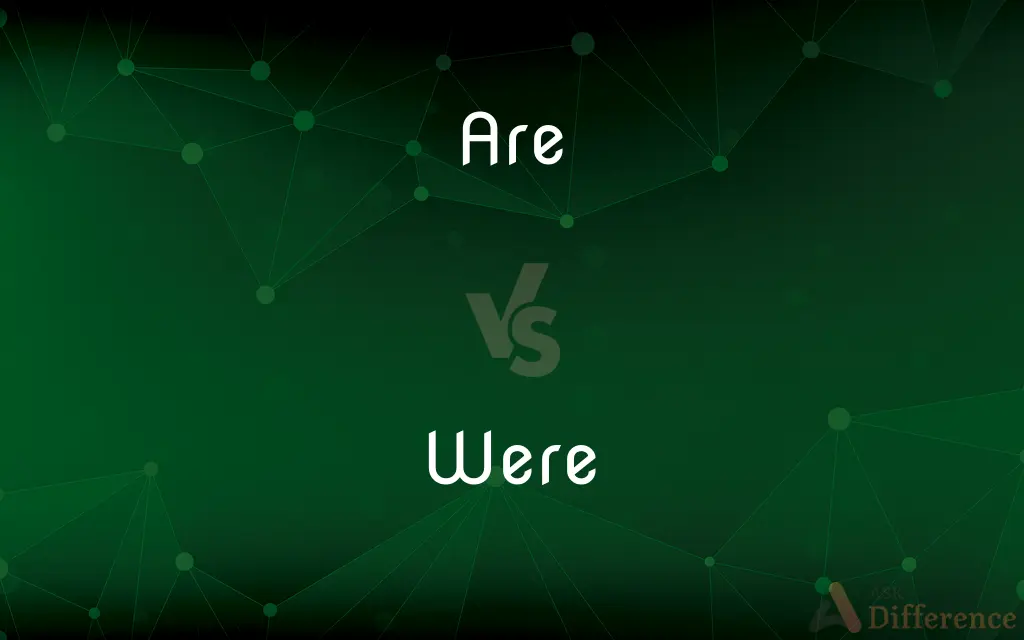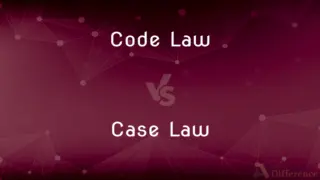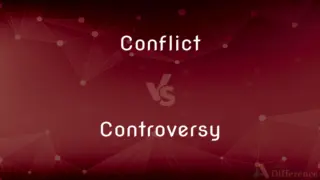Are vs. Were — What's the Difference?
By Tayyaba Rehman — Published on November 29, 2023
"Are" is the present tense form of "be" for plural subjects, while "Were" is the past tense form for both singular and plural subjects.

Difference Between Are and Were
Table of Contents
ADVERTISEMENT
Key Differences
"Are" and "Were" both originate from the verb "be," a fundamental verb in the English language. "Are" serves as the present tense plural form of this verb. When referring to multiple subjects in the present, "Are" is the appropriate choice. "Were," contrastingly, is anchored in the past, serving as the past tense of "be" for all subjects except singular third-person.
Using "Are" implies a current state or action. For instance, when saying "They are playing," it means the play is ongoing right now. "Were" implies the action or state was in the past. If one says "They were playing," it means the play happened previously and is not currently taking place.
Another distinction is the singular and plural application. "Are" is exclusively used with plural subjects like "you," "we," and "they." However, "Were" is more versatile, fitting with both singular (you, he, she, it) and plural subjects in the past tense.
An essential note on "Were" is its use in the subjunctive mood. In sentences like "If I were rich," "Were" is used to express a hypothetical or non-real situation. "Are" doesn't have this subjunctive form.
Lastly, both "Are" and "Were" have imperative roles in forming continuous tenses. "Are" forms the present continuous as in "They are working," and "Were" forms the past continuous as in "They were working."
ADVERTISEMENT
Comparison Chart
Tense
Present
Past
Subject Form
Plural (you, we, they)
Singular (I, he, she, it) & Plural (you, we, they)
Usage Example
They are happy.
They were happy.
Continuous Tense
Present Continuous (They are eating.)
Past Continuous (They were eating.)
Subjunctive Use
Not applicable
Yes (e.g., If I were you...)
Compare with Definitions
Are
Used with plural subjects in the present.
Dogs are loyal animals.
Were
Past tense of "be" for all except third-person singular.
They were teachers.
Are
Indicates a current state for multiple entities.
The doors are open.
Were
Indicates a past state or action.
The cookies were delicious.
Are
Pairs with "you," "we," and "they" in present.
You are my friend.
Were
Employed in the subjunctive mood.
If she were here, she'd know.
Are
Present tense of "be" for plurals.
They are students.
Were
Used in past continuous tense.
I was thinking; they were thinking.
Are
Forms the present continuous tense.
We are studying English.
Were
Second person singular and plural and first and third person plural past indicative of be.
Are
Second person singular and plural and first and third person plural present indicative of be.
Were
Past subjunctive of be. See Usage Notes at if, wish.
Are
A metric unit of area equal to 100 square meters (119.6 square yards).
Were
Inflection of be
John, you were the only person to see him.
Are
Inflection of be
Mary, where are you going?
Were
Inflection of be
We were about to leave.
Mary and John, you were right.
They were a fine group.
They were to be the best of friends from that day on.
Are
Inflection of be
We are not coming.
Were
Inflection of be
I wish that it were Sunday.
I wish that I were with you.
Are
Inflection of be
Mary and John, are you listening?
Were
(Northern England) be.
Are
Inflection of be
They are here somewhere.
Were
(fandom) The collective name for any kind of person that changes into another form under certain conditions, including the werewolf.
Are
Inflection of be
Were
To wear. See 3d Wear.
Are
(rare) An accepted (but deprecated and rarely used) metric unit of area equal to 100 square metres, or a former unit of approximately the same extent. Symbol: a.
Were
To guard; to protect.
Are
Misspelling of our
Were
A weir. See Weir.
Are
The present indicative plural of the substantive verb to be; but etymologically a different word from be, or was. Am, art, are, and is, all come from the root as.
Were
A man.
Are
The unit of superficial measure, being a square of which each side is ten meters in length; 100 square meters, or about 119.6 square yards.
Were
A fine for slaying a man; the money value set upon a man's life; weregild.
Every man was valued at a certain sum, which was called his were.
Are
A unit of surface area equal to 100 square meters
Were
The imperfect indicative plural, and imperfect subjunctive singular and plural, of the verb be. See Be.
Were
Utilized with both singular and plural subjects in past.
He and his friends were at the park.
Common Curiosities
Can "Were" be used with singular subjects?
Yes, "Were" can be used with singular subjects like I, he, she, and it, as well as plurals.
What about "Were"?
"Were" is used in the past tense.
Provide an example of "Were" in the past continuous.
"They were dancing."
Give an example of "Are" in the present continuous tense.
"They are dancing."
Can "Are" be used in a subjunctive mood?
No, "Are" doesn't have a subjunctive form.
Is "Were" only for past actions or states?
Mostly, but it's also used in the subjunctive for non-real or hypothetical situations.
Which is plural: "Are" or "Were"?
Both can be plural, but "Are" is exclusively plural in the present tense.
What tense is "Are" used in?
"Are" is used in the present tense.
How is "Were" used in the subjunctive mood?
"Were" can be used in hypotheticals, like "If I were you..."
Which subjects pair with "Are"?
"Are" pairs with plural subjects: you, we, and they.
How about "Were" in continuous tenses?
"Were" is used in the past continuous tense.
Is "Were" used in any moods other than indicative?
Yes, "Were" is also used in the subjunctive mood.
Is "Are" ever used with singular subjects?
No, "Are" is used with plural subjects.
Can "Are" form continuous tenses?
Yes, "Are" is used in the present continuous tense.
What verb do "Are" and "Were" derive from?
Both "Are" and "Were" come from the verb "be."
Share Your Discovery

Previous Comparison
Code Law vs. Case Law
Next Comparison
Conflict vs. ControversyAuthor Spotlight
Written by
Tayyaba RehmanTayyaba Rehman is a distinguished writer, currently serving as a primary contributor to askdifference.com. As a researcher in semantics and etymology, Tayyaba's passion for the complexity of languages and their distinctions has found a perfect home on the platform. Tayyaba delves into the intricacies of language, distinguishing between commonly confused words and phrases, thereby providing clarity for readers worldwide.















































